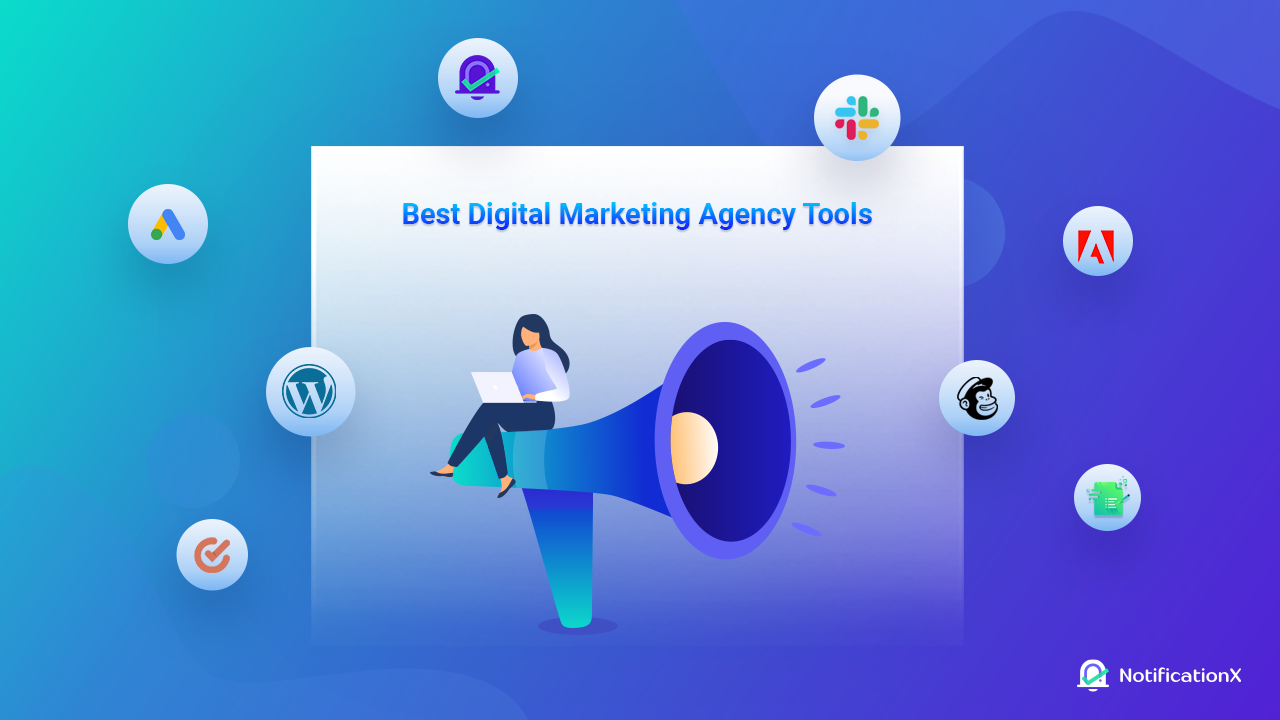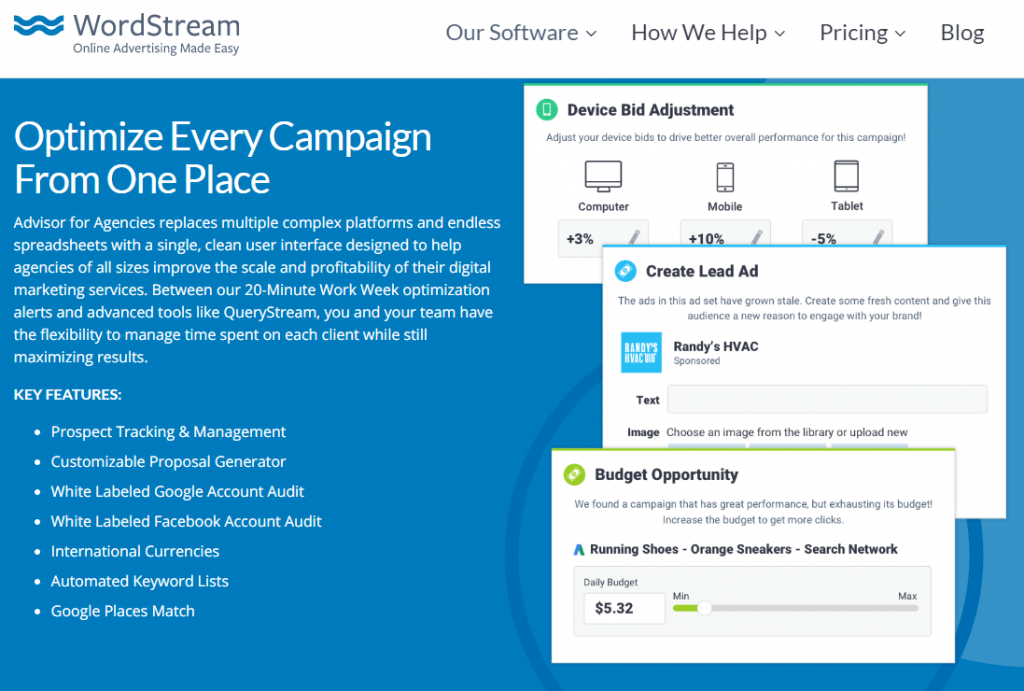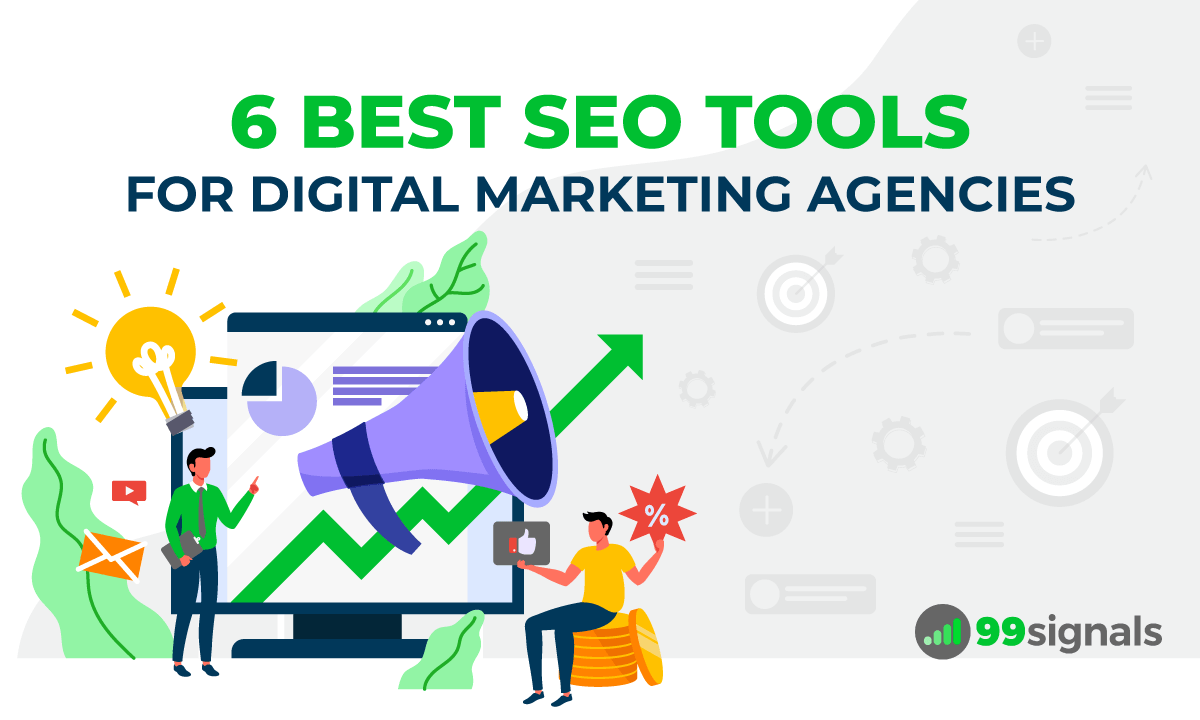Digital marketing agencies rely on various tools. These tools streamline tasks and boost efficiency.
Running a digital marketing agency involves juggling many responsibilities. From managing social media to tracking SEO performance, there’s a lot to handle. The right tools can make these tasks easier. They help you stay organized, save time, and deliver better results for clients.
Understanding which tools to use is crucial for any agency’s success. In this post, we’ll explore some of the best tools for digital marketing agencies. These tools cover various aspects like analytics, content creation, and project management. By the end, you’ll have a clear idea of which tools can elevate your agency’s performance. Let’s dive in!
Seo Tools
SEO tools are crucial for any digital marketing agency. They help improve a website’s visibility on search engines. Good SEO tools can save you time and effort. They provide insights into keyword performance, competitor strategies, and backlink profiles.
Keyword Research
Keyword research is the foundation of any SEO strategy. It involves finding the right keywords to target. These tools help you understand what your audience is searching for.
- Google Keyword Planner: Free tool for finding keyword ideas.
- Ahrefs: Offers in-depth keyword data and analysis.
- SEMrush: Provides keyword difficulty and search volume.
Competitor Analysis
Competitor analysis tools help you understand your rivals. You can see what keywords they rank for and their backlink profiles. This helps you identify gaps and opportunities.
- SpyFu: Shows your competitors’ top-performing keywords.
- MOZ: Offers insights into competitor domain authority.
- BuzzSumo: Analyzes the most shared content of your competitors.
Backlink Tracking
Backlinks are vital for SEO success. They show search engines that your site is trustworthy. Backlink tracking tools help you monitor and manage your backlink profile.
- Majestic SEO: Provides detailed backlink data and metrics.
- Ahrefs: Tracks new and lost backlinks efficiently.
- Monitor Backlinks: Alerts you about new backlinks and their status.

Credit: notificationx.com
Content Marketing Tools
Content marketing is essential for any digital marketing agency. The right tools can help create, distribute, and track content. Here are some of the best content marketing tools available.
Content Creation
Creating quality content is the first step. Some tools can help make this easier.
- Grammarly: This tool checks for grammar and spelling errors. It also suggests better word choices.
- Canva: Create engaging images and graphics easily. It has many templates and is user-friendly.
- BuzzSumo: Find popular content ideas. It shows what is trending in your niche.
Content Distribution
Distributing content effectively ensures it reaches your audience. Use these tools to help.
- Hootsuite: Schedule posts across social media platforms. It saves time and keeps content organized.
- Mailchimp: Send newsletters and email campaigns. It has many templates and automation options.
- Buffer: Another great tool for scheduling posts. It also offers analytics to track performance.
Content Performance Tracking
Tracking how content performs helps improve future efforts. These tools are valuable for this purpose.
- Google Analytics: Measure website traffic and user behavior. It provides detailed reports.
- Ahrefs: Track keywords and backlinks. It also offers content analysis.
- SEMrush: Another excellent tool for tracking SEO performance. It helps with keyword research and competitor analysis.
Social Media Management Tools
Managing social media for a digital marketing agency can be challenging. Social media management tools make this easier. These tools help in planning, engaging, and monitoring. Let’s look at some key features.
Scheduling Posts
Planning content ahead of time is crucial. Tools like Hootsuite and Buffer allow you to schedule posts. This ensures a consistent presence. You can create a content calendar. This helps in organizing posts across multiple platforms.
Here is a comparison:
| Tool | Platform Support | Scheduling Features |
|---|---|---|
| Hootsuite | Facebook, Twitter, Instagram, LinkedIn | Auto-scheduling, Bulk Scheduling |
| Buffer | Facebook, Twitter, Instagram, LinkedIn | Custom Scheduling, Queue Management |
Engagement Tracking
Tracking engagement helps in understanding audience behavior. Tools like Sprout Social and Zoho Social offer detailed analytics. You can monitor likes, comments, and shares. This helps in measuring the success of your campaigns.
Key metrics include:
- Post Reach
- Engagement Rate
- Audience Growth
Social Listening
Understanding conversations about your brand is vital. Tools like Brand24 and Talkwalker provide social listening features. You can track mentions and keywords. This helps in responding to feedback quickly.
Benefits of social listening:
- Identify Trends
- Monitor Brand Sentiment
- Respond to Customer Feedback

Credit: customers.ai
Email Marketing Tools
Email marketing tools are vital for any digital marketing agency. They help in reaching a wider audience and nurturing leads. These tools streamline the email marketing process and improve campaign effectiveness. Below, explore the best features of email marketing tools for your agency.
Automated Campaigns
Automated email campaigns save time and increase efficiency. They allow you to send emails based on user actions. For example, welcome emails after sign-ups or reminders for abandoned carts. This personalization boosts engagement and conversion rates. Automation also ensures timely communication with your audience.
A/b Testing
A/B testing helps optimize your email campaigns. This feature lets you test different subject lines, content, and call-to-actions. You can see what works best for your audience. By analyzing the results, you can refine your strategy. This leads to better open and click-through rates.
Analytics And Reporting
Analytics and reporting are crucial for measuring email campaign success. These tools provide insights into open rates, click rates, and conversions. You can track the performance of each campaign. Detailed reports help identify strengths and areas for improvement. This data-driven approach enhances your email marketing efforts.
Analytics Tools
Analytics tools are crucial for a digital marketing agency. They help measure and analyze key metrics. These tools provide insights into website performance, user behavior, and conversion rates. Here are some essential analytics tools every agency should consider:
Website Traffic Analysis
Website traffic analysis tools track and report website visitors. They provide data on the number of visitors, page views, and sources of traffic. Popular tools include:
- Google Analytics: Offers detailed insights into website traffic and user behavior.
- Semrush: Provides traffic analytics and keyword ranking information.
- Ahrefs: Known for backlink analysis, also offers traffic data.
Conversion Tracking
Conversion tracking tools measure the effectiveness of marketing efforts. They help understand which strategies lead to conversions. Key tools include:
- Google Ads: Tracks conversions from PPC campaigns.
- Facebook Pixel: Measures actions taken on your website from Facebook ads.
- Hotjar: Provides heatmaps and session recordings to understand user actions.
User Behavior Insights
User behavior insights tools analyze how users interact with your website. They reveal patterns and behaviors, helping to optimize the user experience. Essential tools include:
- Crazy Egg: Offers heatmaps, scroll maps, and user recordings.
- Mixpanel: Tracks user interactions and provides detailed analytics.
- Hotjar: Combines heatmaps, feedback polls, and surveys for comprehensive insights.
Pay-per-click (ppc) Tools
Effective PPC tools help digital marketing agencies manage and optimize ad campaigns efficiently. These tools ensure better keyword targeting, ad placement, and performance tracking.
Pay-Per-Click (PPC) tools are essential for any digital marketing agency. They help in managing and optimizing ad campaigns. With the right tools, agencies can improve their ad performance and ROI. Let’s explore some key areas: Ad Creation, Bid Management, and Performance Monitoring.
Ad Creation
Creating effective ads is crucial. Good PPC tools can simplify this process. Tools like Google Ads Editor and AdEspresso offer easy-to-use interfaces. They provide templates and suggestions for crafting compelling ads.
- Google Ads Editor: Allows bulk edits and offline work.
- AdEspresso: Provides A/B testing and detailed analytics.
Bid Management
Managing bids effectively can save costs and boost ad placements. Tools such as Marin Software and Kenshoo offer advanced bid management features. They use algorithms to adjust bids based on performance.
| Tool | Features |
|---|---|
| Marin Software | Automated bid adjustments, cross-channel management |
| Kenshoo | Bid optimization, performance insights |
Performance Monitoring
Tracking ad performance is key to success. PPC tools like SEMrush and SpyFu help monitor and analyze ad performance. They provide detailed reports and competitor insights.
- SEMrush: Offers keyword tracking and competitor analysis.
- SpyFu: Provides competitor PPC data and keyword research.
With these tools, agencies can ensure their PPC campaigns are effective and efficient.
Customer Relationship Management (crm) Tools
Customer Relationship Management (CRM) Tools are essential for any digital marketing agency. These tools help manage interactions with clients and potential customers. They store data, track sales, and improve customer service. Effective CRM tools can transform the way you do business. They streamline processes and help you stay organized. Below are some key features of CRM tools.
Lead Management
Lead management is crucial for converting potential clients into actual customers. A good CRM tool can help you:
- Collect and store lead information
- Track interactions with leads
- Score leads based on engagement
- Automate follow-up emails
Using a CRM for lead management can save time. It ensures no lead falls through the cracks.
Customer Segmentation
Customer segmentation involves dividing your customer base into groups. Each group shares similar characteristics. A CRM tool can help you:
- Segment customers by demographics
- Identify buying patterns
- Create targeted marketing campaigns
- Analyze customer behavior
Effective customer segmentation leads to more personalized marketing. It increases the chances of conversion.
Sales Pipeline Tracking
Sales pipeline tracking helps you visualize the sales process. A CRM tool can help you:
- Track each stage of the sales process
- Identify bottlenecks
- Forecast sales
- Monitor team performance
Sales pipeline tracking provides clarity. It helps in making informed decisions. This can ultimately improve sales outcomes.
Design And Visual Content Tools
In the realm of digital marketing, design and visual content play a pivotal role. Engaging visuals can make your content stand out. They capture attention and convey messages quickly. Here are some essential tools to help you create stunning visual content.
Graphic Design
Graphic design tools allow you to create unique visuals. These visuals can enhance your brand identity and attract your audience. Some top tools include:
- Canva: User-friendly with a vast library of templates.
- Adobe Photoshop: Powerful features for detailed designs.
- Sketch: Ideal for UI/UX design, easy to use.
These tools offer various features. For example, Canva is great for beginners. Adobe Photoshop is perfect for complex designs. Sketch suits professionals focused on UI/UX.
Video Editing
Video content is essential for digital marketing. It can engage audiences more than text. Here are some top video editing tools:
- Adobe Premiere Pro: Comprehensive features for professional editing.
- Final Cut Pro: Best for Mac users, high-quality output.
- iMovie: Simple and free for basic editing on Mac.
Adobe Premiere Pro offers advanced editing options. Final Cut Pro is excellent for Mac users. iMovie is suitable for quick and easy edits.
Infographic Creation
Infographics present data in a visually appealing way. They help in making complex information easy to understand. Some popular tools include:
- Venngage: Easy to use, with numerous templates.
- Piktochart: Great for creating professional infographics.
- Infogram: Offers interactive infographic options.
Venngage is perfect for beginners. Piktochart offers professional-grade infographics. Infogram provides interactive elements to engage users.
These tools are indispensable for a digital marketing agency. They enhance the visual appeal of your content. Choose the right tool based on your needs and skills.

Credit: www.99signals.com
Frequently Asked Questions
What Are The Best Tools For Digital Marketing?
The best tools for digital marketing include Google Analytics, SEMrush, and HubSpot. Each tool offers unique features that enhance marketing strategies. They help with analytics, SEO, and content management.
How Can Semrush Improve Seo Efforts?
SEMrush improves SEO efforts by providing in-depth keyword research, backlink analysis, and competitor insights. These features help optimize content and improve search engine rankings.
What Features Does Hubspot Offer For Marketing?
HubSpot offers features like email marketing, social media management, and CRM integration. These tools streamline marketing processes and improve customer engagement.
Why Is Google Analytics Essential For Marketers?
Google Analytics is essential for marketers because it tracks website traffic, user behavior, and conversion rates. It helps in making data-driven decisions.
Conclusion
To sum up, digital marketing tools boost your agency’s success. They streamline tasks, enhance productivity, and improve client results. Selecting the right tools makes a huge difference. Stay updated with the latest options. Test various tools to see what fits best.
Your agency’s growth depends on smart choices. Invest time in finding what works for you. Your clients will appreciate the improved service. Happy marketing!







